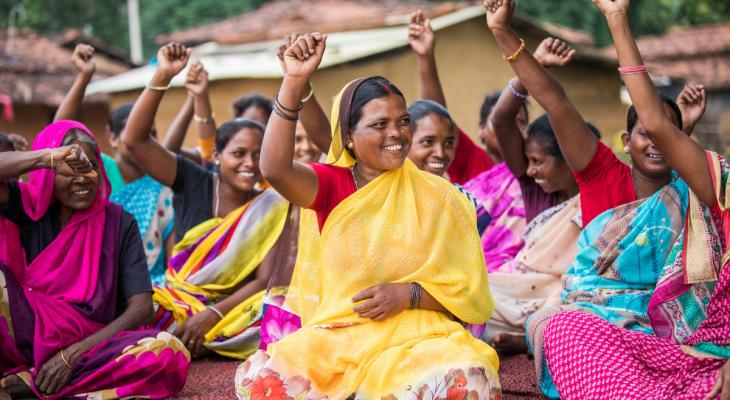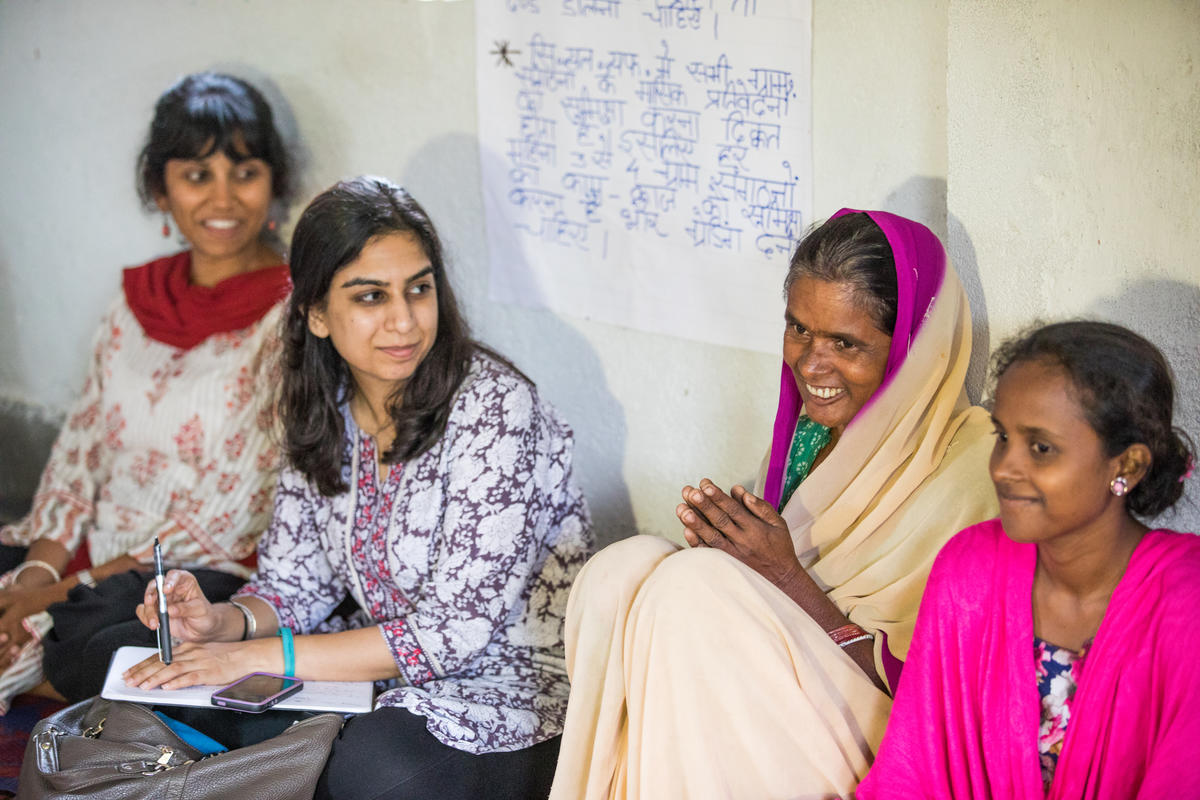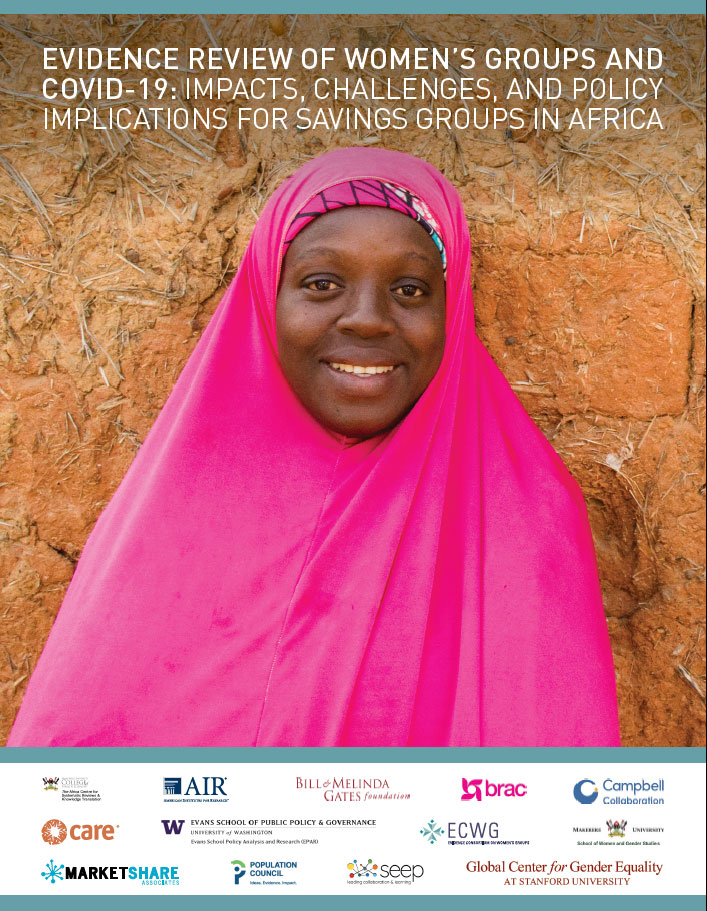Evidence Consortium on Women's Groups

©Gates Archive/Mansi Midha
Women and girls in low-and middle-income countries continue to face societal and structural barriers related to education, employment, and health status that limit their opportunities and well-being. For example, only 27% of women in India participate in the labor force, compared with almost 79% of men. Women are also overrepresented among those without bank accounts; in India and Kenya, more than 60% of unbanked adults are women. As a result, women in low- and middle-income countries are less likely than men to save money and to have emergency funds available.
Women in developing countries also face multiple social barriers: 50% of women in Uganda, 39% in Kenya, and 29% in India face lifetime physical or sexual intimate partner violence. Maternal mortality also remains a significant challenge in many Sub-Saharan countries; in 2015, one in 13 pregnant women in Nigeria faced a lifetime risk of maternal death.
To counter these challenges, governments, development agencies, and nongovernmental organizations have invested in different types of women’s groups, including economic self-help group programs and women’s groups practicing participatory learning and action. For example, the Bill & Melinda Gates Foundation Gender Equality team has invested in multiple forms of women's groups in South Asia and Africa to advance women’s empowerment and well-being.
Systematic Review
To achieve their goals, the foundation and policymakers need a credible evidence base. A systematic review suggests that economic self-help group programs can improve women’s economic, social, and political empowerment, but there are gaps in the evidence base:
This work will help stakeholders understand exactly how women's groups operate and what their impact is.
- Impact evaluations provide only limited documentation on the types or functioning of women’s group intervention models. This information would affect improvements in the implementation of government-supported women’s collectives.
- The evidence base on the effects and cost-effectiveness of women’s groups could be broader and more rigorous. For example, it is critical to obtain more evidence about the differences in effects across women’s group models and sectors; the pathways through which women’s groups can improve women’s empowerment, socioeconomic, and health outcomes; factors that moderate their effects; and their cost-effectiveness relative to alternative programs.
- The definition of women’s empowerment, and approaches to achieving it, have been inconsistent across collectives. It will be important to develop and apply measures for empowerment and socioeconomic, health, and agricultural outcomes that are specific to women’s groups.
- Evidence syntheses have surfaced a wide range of quantitative and qualitative studies on women’s groups (although primarily on self-help groups) but very few rigorous mixed-methods studies.
Research Consortium

©Gates Archive/Mansi Midha
To address these evidence gaps, AIR and the Population Council will co-lead the Evidence Consortium on Women’s Groups (ECWG) with the Evans School of Public Policy Analysis and Research Group at the University of Washington, Stanford University, the Campbell Collaboration, and the Africa Centre for Systematic Reviews and School for Women and Gender Studies at Makerere University, Uganda. Supported by the Gender Equality team of the Bill & Melinda Gates Foundation, the ECWG will strengthen, expand, and disseminate the global evidence base on women’s groups, with a specific focus on India, Nigeria, and Uganda. The ECWG’s primary goal is to generate rigorous empirical evidence on how women’s groups can contribute to achieving gender equality goals.
This work can be broken down into three separate but interlinked streams:
- Generate and synthesize evidence on the impact, cost-effectiveness, and scalability of women’s groups: Guided by our learning agenda, we address evidence-gaps by generating and synthesizing evidence on the impact, cost-effectiveness, and implementation models of women’s groups in South Asia and sub-Saharan Africa, with a particular emphasis on India, Nigeria, and Uganda.
- Use evidence to inform women’s groups programming in India, Nigeria, and Uganda: We work closely with partners to ensure that evidence generated strengthens program implementation. We also develop and help partners introduce robust, standardized measurement tools to determine groups' cost-effectiveness and their impact on empowerment, health, and economic outcomes.
- Serve as the evaluation and evidence partner on women’s groups for the Bill & Melinda Gates Foundation Gender Equality Team: We conduct evaluations of the Gates Foundation’s investments in women’s groups and synthesize evidence to inform the Gates Foundation’s gender equality strategy. We serve as a learning partner to Program Officers of the Gender Equality team by identifying and addressing evidence gaps and extracting learnings from their work to answer key learning questions and sharing lessons and insights.
COVID-19 Resources
As is the case around the world, the COVID-19 pandemic has disproportionately affected women and has reversed progress in gender equality across sub-Saharan Africa. However, recent studies indicate that women’s savings groups have adapted in various contexts to the pandemic. For example, studies from Nigeria and Uganda suggest that these groups cushion some of the economic impacts and have been key in supporting community responses during the crisis.
 AIR collaborated with a group of practitioners, researchers, and funders to conduct an evidence review of how women’s savings groups and their members have navigated the pandemic. Based on emerging findings, they advance a series of recommendations for how governments, organizations, donors, and researchers can support savings groups. Evidence Review of Women's Groups and COVID-19: Impacts, Challenges, and Policy Implications for Savings Groups in Africa (March 2021, PDF) captures findings from studies undertaken across sub-Saharan Africa over the past year. It focuses on the impact the pandemic (and some of the associated policy responses) have had on savings groups and other women’s groups as well as the ability of these groups to mitigate the effects of shocks for their members and communities. View the full report (PDF) or the executive summary (PDF).
AIR collaborated with a group of practitioners, researchers, and funders to conduct an evidence review of how women’s savings groups and their members have navigated the pandemic. Based on emerging findings, they advance a series of recommendations for how governments, organizations, donors, and researchers can support savings groups. Evidence Review of Women's Groups and COVID-19: Impacts, Challenges, and Policy Implications for Savings Groups in Africa (March 2021, PDF) captures findings from studies undertaken across sub-Saharan Africa over the past year. It focuses on the impact the pandemic (and some of the associated policy responses) have had on savings groups and other women’s groups as well as the ability of these groups to mitigate the effects of shocks for their members and communities. View the full report (PDF) or the executive summary (PDF).
The Impact of COVID-19 on Opportunities for Adolescent Girls and the Role of Girls' Groups (September 2020, PDF) offers insight into how group-based programs for girls in low- and middle-income countries are responding to the pandemic.
Women’s Groups and COVID-19: Challenges, Engagement, and Opportunities (June 2020, PDF) presents the implications of the pandemic and lockdown for women’s groups, with a focus on India, Nigeria, and Uganda.
 The Evidence Consortium on Women’s Groups (ECWG) is funded by a grant from the Bill & Melinda Gates Foundation and aims to address evidence gaps on how groups and collectives can contribute to achieving women’s empowerment and well-being, and to understand their implementation models and cost-effectiveness. The consortium is co-led by the American Institutes for Research and the Population Council, with partners from the University of Washington, Stanford University, the Campbell Collaboration, and Makerere University. To learn more, please visit http://www.womensgroupevidence.org or e-mail info@womensgroupevidence.org
The Evidence Consortium on Women’s Groups (ECWG) is funded by a grant from the Bill & Melinda Gates Foundation and aims to address evidence gaps on how groups and collectives can contribute to achieving women’s empowerment and well-being, and to understand their implementation models and cost-effectiveness. The consortium is co-led by the American Institutes for Research and the Population Council, with partners from the University of Washington, Stanford University, the Campbell Collaboration, and Makerere University. To learn more, please visit http://www.womensgroupevidence.org or e-mail info@womensgroupevidence.org

